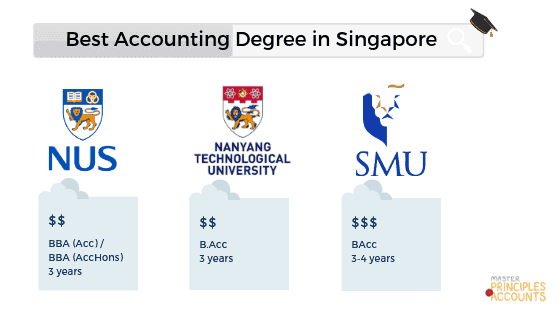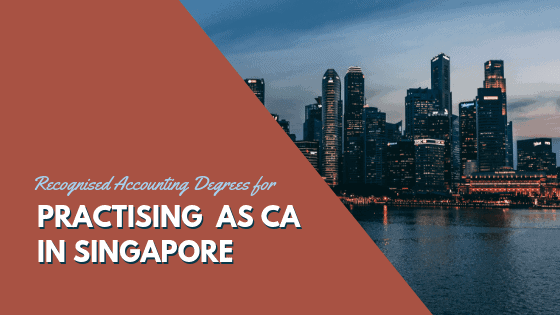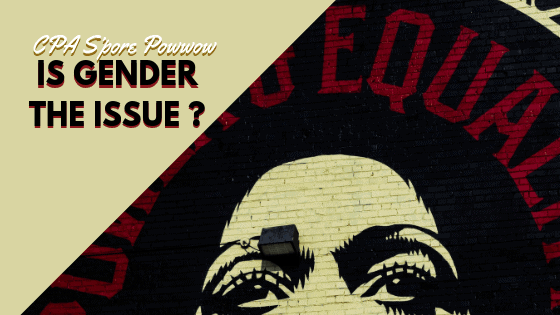2021 Guide to Accounting Programs in NTU, SMU and NUS
2021 Guide to Accounting Degrees in Singapore
If you’re looking to build a career in business, finance or accountancy, earning an accounting degree would undoubtedly be a good place to start. After all, in 2018, those in the accounting sector are amongst the best paid professionals, according to Kelly Services. You may be toying with the idea of becoming a forensic accountant, an auditor, a chartered accountant, a CFO, a public accountant, or even a banker; but all these jobs would require a bachelor’s degree at the very minimum, some of which even mandates specialised certifications and accreditations.
But let’s take a step back and think about that very first important stage. Indeed, the real conundrum for most school-leavers is picking the right institution that offers the best suited programme. A multitude of questions and considerations may likely flood your mind right now – which university is cheapest, how recognised is the degree, how long is the entire course duration, do they offer internship opportunities? Don’t panic, but that really is just the tip of the iceberg…so breathe!
A plethora of choices
If it is of any consolation, undergraduate programmes in accounting are very popular – and very valuable – given that accountancy is pretty much a fundamental element in every business. On the flip side, this also means almost every higher learning centre you can find, would most likely have an accounting programme of some sort. And the education landscape in Singapore is no different.
There is an array of colleges and universities that you may choose from to study accounting. But choose wisely you must! After all, it is not just about the theories you learn from textbooks or accounting methodologies you master along the way. Choosing the right programme for you may very well equip yourself with the right tools to shape and pave your career path. Of course, practical factors are just as important like how much it is going to cost you (or your parents), the relevance of the curriculum to your desired career prospects, even the location which may or may not result in long and tiring daily commutes. But in addition to that, there should also be room to think about the bigger picture, such as job opportunities and even a chance to see the world via global exchange programmes.
Know your priorities
So, to give you a better idea of some of the key aspects to consider when choosing an institution, let’s narrow the search down to three top-ranked universities – Nanyang Technological University (NTU), National University of Singapore (NUS) and Singapore Management University (SMU). It is ultimately your decision as to which aspect holds more weight, so it is not a decision to be made on a whim.
As you can see, each university has its strengths. The comparisons above are not meant to put either one down and it would not even be fair because what appeals to one student, may be a put-off to another. Having said that, do pay attention to a few features that do stand out above the rest.
| NTU | NUS | SMU | |
| Direct Honours | Yes | Yes | Yes |
| Faculty | Nanyang Business School | NUS Business School | School of Accounting |
| Programme Options | · Bachelor of Accountancy (with/without Minor in International Trading or Strategic Communication) · Bachelor of Accountancy with a Second Specialisation in Predictive & Forensic Analytics · Double Degree in Accountancy & Business |
· Bachelor of Business Administration (Accountancy) – with/without Honours · BBA with 2nd Major in Economics, Psychology, Comms& New Media or Business Analytics · BBA with Minor in Statistics, Psychology, Real Estate, Public Health, Financial Mathematics or Comms& New Media · Double Degree BBA and Comms& New Media, Computing, Economics, Engineering, Law, MPP, MSc |
· Bachelor of Business Administration (Accountancy) – with/without Honours · Bachelor of Accountancy · Bachelor of Accountancy with 2nd Major in Accounting Data & Analytics · Double Degree in BAcc and Business Management, Economics, Law, Information Systems or Social Sciences |
| Initials upon Graduation | B.Acc | BBA (Acc) / BBA (AccHons) | BAcc |
| EntryRequirements | · H1 Level pass in Mathematics · ‘O’ Level/equivalent pass in Additional Mathematics |
· H1/H2/H3 Curriculum:Best four content subjects, with at least one from a contrasting discipline · ‘A’/‘AO’ Curriculum: · Best three ‘A’ Level content subjects |
· Good passes in at least 3 H2 content-based subjects · Good passes in at least 3 GCE A-Level subjects and General Paper |
| Admission Exam / Interview | On selective basis | Exam (for shortlisted applicants) | Interview (for shortlisted applicants) |
| Course Duration | 3 years (6 semesters) |
3 years (6 semesters) |
3, 3.5 or 4 years |
| Course Fees per annum (based on 2018 fee structure) |
S$36,830 S$9,400 (SG citizens) S$13,200 (SG PRs) |
S$32,250 S$9,600 (SG citizens) S$13,450 (SG PRs) |
S$43,870 S$11,450 (SG citizens) S$16,000 (SG PRs) |
| Financial Assistance (for Tuition Fees) |
· Tuition Fee Loan (TFL) Scheme · CPF Education Scheme · Post-Secondary Education Account (PSEA) · Mendaki Tertiary Tuition Fee Subsidy (TTFS) · Study Loan |
· NUS Scholarships · NUS Business Dean’s &MochtarRiady Scholarships · Dhanabalan Scholarship · Ian Ferguson Scholarship · Win Advisors Scholarship · Isaac Manasseh Meyer Scholarship · Isetan Foundation Scholarship · Mizuho Scholarship · Ng Guan Memorial Scholarship · Singapore Chinese Chamber of Commerce Foundation Scholarships · KPMG Scholarship · PwC Scholarship · Dr GohKengSwee (GKS) Scholarship · SingTel Group Undergraduate Scholarship |
(Focused on accountancy programme): · Lee Kong Chian Scholars’ Programme · SMU SOA Financial Scholarship · SMU SOA Financial Scholarship · Lim Hoon Foundation Scholarship · SMU School of Accountancy Aspiration Scholarship · Centurion Corporation Limited Scholarship · Professor Tan TeckMeng Study Award · RSM | Stone Forest Financial Scholarship · School of Accountancy Financial Scholarship · SMU SOA Endowed Scholarship · ABS Study Award · Collaboration (同心清诚) Scholarship · DFS Scholarship · Foo Kon Tan Scholarship · Moore Stephens Scholarship (among other generic scholarships) |
| Accreditations | · Institute of Singapore Chartered Accountants (ISCA) · Accounting and Corporate Regulatory Authority (Singapore) · ICAEW · Institute of Chartered Accountants in Australia · CPA Australia · Association of Chartered Certified Accountants and the Chartered Institute of Management Accountants · Association to Advance Collegiate Schools of Business (AACSB) |
· Association to Advance Collegiate Schools of Business (AACSB) · ACCA · ICAEW · CPA Australia · CIMA · Singapore CA Qualification |
· ICAEW · AACSB · ISCA · SAC · CIMA · ACCA · CPA Australia · CMA Australia · IMA · ACRA · CA ANZ |
| Internship Opportunities | Experiential Semester Programme (ESP) – 1 semester after completing Year 2 Semester 1 | Credit-Bearing Internships – 8 or 16 weeks (Year 2 onwards) – at least 2 internships possible |
Internships possible, locally or abroad |
| Exchange Programme | · GEM Explorer (1 semester abroad) · GEM Discoverer (2-6 weeks travelling abroad while earning academic credits) · GEM Discoverer Work & Study (6 months of study, research & internship abroad) · SUSEP – Singapore Universities Student Exchange Programme (tripartite with NUS & SMU) |
NUS Business School collaborates with close to 100 school-level partner universities worldwide for its student exchange programme and summer programmes. | The student exchange programme at a partner university (231 partners across the globe) will last for a term (unless stated otherwise), or up to one year. |
| Career Prospects | |||
| Career preparation | NBS’ Career Services team help undergrads define career goals and map a path to achieve those objectives through workshops, courses, seminars and also mentoring programmes. | NUS has a Center for Future-ready Graduates while its Business School’s Career Services Office also supports students with initiatives like Career Creation Programme. | Finishing Touch Programme (mandatory) – 2 workshops in career planning & self-discovery (Year 1), and 5 workshops in career skills (Year 2). |
| Median Starting Salary | S$3,000 – S$3,500 | S$3,000 – S$3,100 | S$3,000 – S$3,500 |
Soak up some global exposure
For starters, what is a tertiary experience without a vibrant campus life or a chance to visit a foreign country where you could truly immerse yourself in new cultures and adventures? NTU’s student exchange programme is a well thought-out initiative which allows students to do just that. Conversely, this means NTU also welcomes students from other parts of the globe and share a little bit of their own cultures and identity with local students.
These values of inclusion and diversity may be subtle exposures but goes a long way in shaping minds to become matured, sensible, sophisticated individuals who would be ready to take on the world. Of course, along with NTU’s relatively cheaper fees, it makes every bit of a difference for those who are on a budget. Just because you pay less, does not mean you compromise on the quality education and learning experience.
Co-curate your degree to your needs
On the other hand, NUS students are pretty spoilt for choices when it comes to pairing options for a double major or a minor. This flexibility is a great advantage as it allows graduates to prepare for the emerging trend of cross-disciplinary jobs. Also, you would less likely have to put up with irrelevant elective classes, and instead just focus on the actual credits you want and need. You may not usually have to decide immediately upon enrolment, which gives you a bit of time to explore your options. But this works especially well if you already know what additional skills or specialisation you need to acquire to fulfil your career goals.
In other words, NUS students have the luxury to customise their own degrees, to a certain extent – almost like how major universities and colleges around the world (including Harvard and Berkeley) are allowing students to design their own degrees.
Groomed to impress
And then there’s SMU, which may be a smaller university, but do not underestimate the underdog city campus. Perhaps it is a marketing USP or perhaps the urban vibe has something to do with it, but SMU graduates are generally known to be more savvy and slick. Straight-A’s may get you interviews, but acing it may require that extra edge where the right attitude and business flair come to play. This could very well explain why SMU graduates tend to be able to command a higher starting salary compared to their counterparts from NUS or NTU, even though the salary range for accounting graduates is quite even among all three universities.
Their Finishing Touch programme is made compulsory for all students, which tells you how serious SMU is about maximising job prospects for all its students. Graduates should expect to be equipped with specific tools, in which they could capitalise on to carve a career path of their desires. After all, what good is a degree if it is not going to score you the job of your dreams, or at least help you map out the way towards achieving that ambition.

Surround yourself with assets, not liabilities
It is not unknown that everything has its pros and cons, and the same goes with choosing a university. But knowing how to choose what works best for YOU, separates you from the pack. Gone are the days when you mindlessly follow what others do or merely go with the flow without first thinking if it is the best way for you. Compliance and conformity are not always bad, but there is a fine line where you need to pause and evaluate in scrutiny the options. As the great Benjamin Franklin put it, “an investment in knowledge always pays the best interest”. But it is equally, if not more, crucial to arm yourself with an education that has the highest value-add worth to you.
JOIN MORE THAN 600 STUDENTS
And triumph Principles of Accounts!








